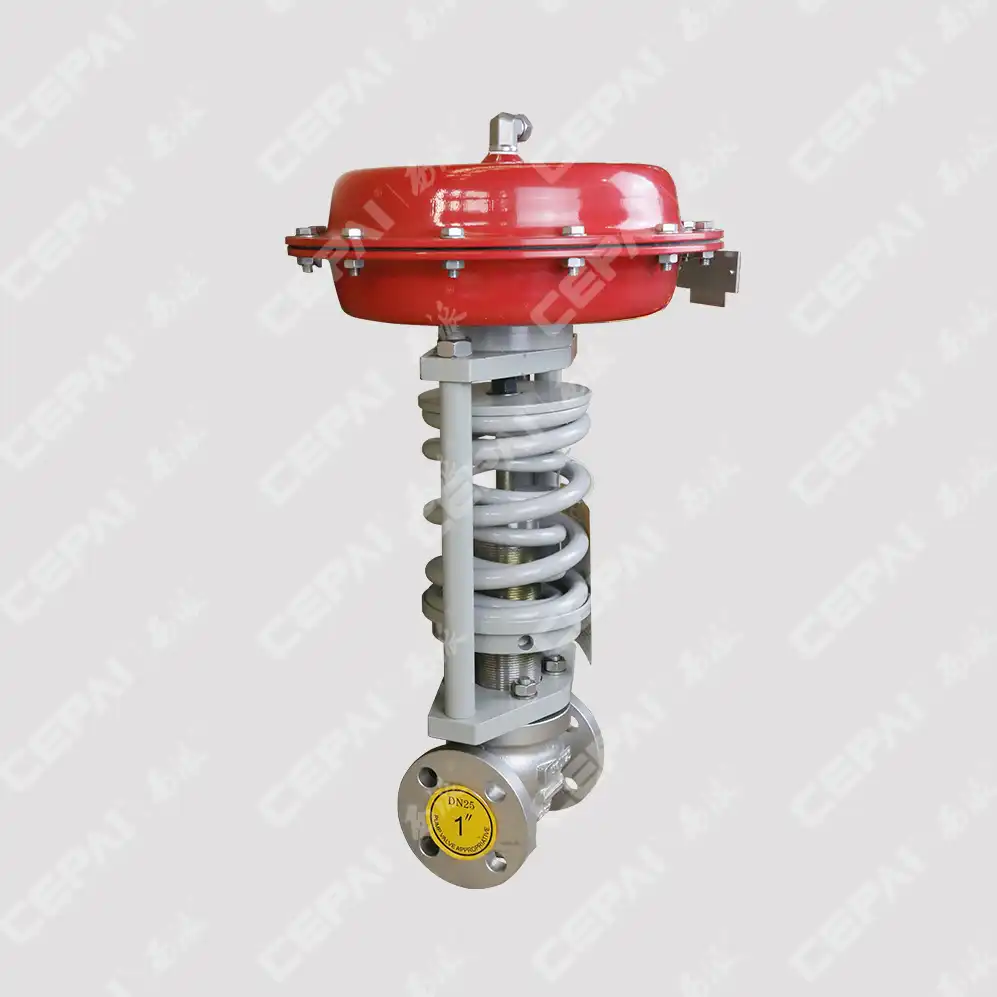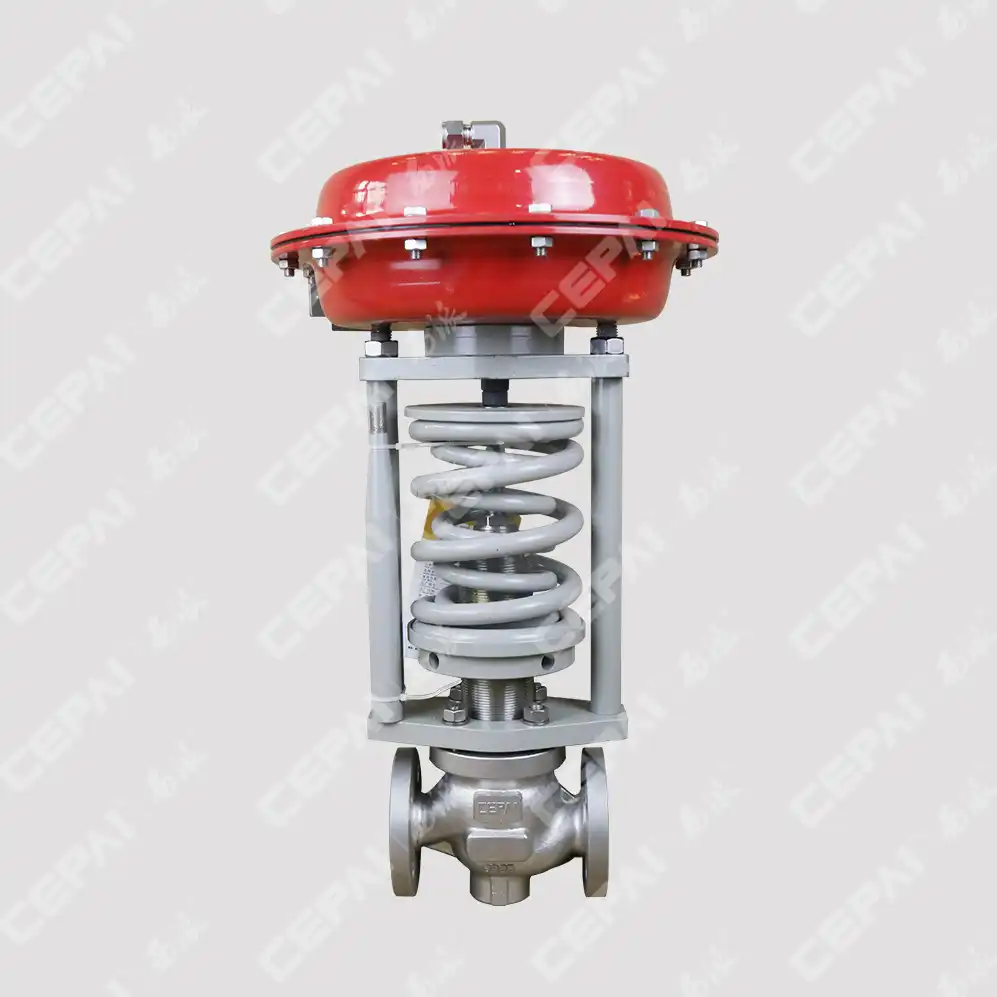Boosting Production Efficiency Using Pneumatic Control Valves in Automated Equipment
In today's rapidly evolving industrial landscape, manufacturers are constantly seeking innovative solutions to enhance production efficiency while maintaining superior quality standards. The integration of advanced Pneumatic Control Valve systems within automated equipment has emerged as a game-changing technology that significantly transforms manufacturing processes across various industries. These sophisticated control mechanisms offer unprecedented precision in fluid flow management, enabling manufacturers to achieve optimal performance levels while reducing operational costs and minimizing downtime. By implementing state-of-the-art pneumatic control technologies, companies can establish competitive advantages through improved process control, enhanced system reliability, and streamlined operational workflows that directly contribute to increased productivity and profitability.
Understanding the Fundamentals of Pneumatic Control Systems in Industrial Automation
Core Components and Operating Principles of Pneumatic Control Valve Technology
The foundation of effective industrial automation lies in understanding the intricate mechanisms that govern Pneumatic Control Valve operations. These sophisticated devices utilize compressed air as the primary actuating medium, converting pneumatic signals into precise mechanical movements that regulate fluid flow with exceptional accuracy. The fundamental operating principle involves a pneumatic actuator that receives control signals from automated systems, translating these inputs into specific valve positioning commands. Modern Pneumatic Control Valve assemblies incorporate advanced materials such as high-grade stainless steel, specialized alloys, and engineered polymers that ensure long-term durability under demanding industrial conditions. The integration of intelligent positioners and feedback systems enables real-time monitoring and adjustment capabilities, allowing for dynamic response to changing process conditions. Advanced manufacturing facilities like those operated by leading companies in the valve industry employ cutting-edge production techniques that guarantee consistent quality and reliability across all Pneumatic Control Valve products, ensuring optimal performance in critical applications.

Integration Methodologies for Automated Manufacturing Systems
Successful implementation of Pneumatic Control Valve technology requires comprehensive understanding of integration methodologies that seamlessly connect these devices with existing automated manufacturing infrastructure. Modern industrial facilities demand sophisticated control architectures that can accommodate multiple valve configurations while maintaining centralized monitoring and control capabilities. The integration process begins with detailed system analysis to determine optimal valve placement, sizing requirements, and control signal specifications that align with overall production objectives. Advanced Pneumatic Control Valve systems incorporate standardized communication protocols such as HART, Foundation Fieldbus, and Profibus, enabling seamless connectivity with distributed control systems and programmable logic controllers. These communication capabilities facilitate real-time data exchange between valve assemblies and central control systems, providing operators with comprehensive process visibility and control authority. Leading manufacturers in the valve industry have developed specialized integration tools and software platforms that simplify configuration processes while ensuring optimal system performance and reliability throughout the operational lifecycle.
Performance Optimization Strategies for Maximum Efficiency
Achieving optimal performance from Pneumatic Control Valve installations requires implementation of comprehensive optimization strategies that address various operational parameters affecting system efficiency. Performance optimization begins with proper valve selection based on specific application requirements, including flow characteristics, pressure ratings, temperature ranges, and chemical compatibility considerations. Advanced control algorithms incorporated into modern Pneumatic Control Valve systems enable adaptive tuning capabilities that automatically adjust operating parameters in response to changing process conditions. These intelligent systems utilize machine learning techniques to optimize valve positioning, minimize hunting behavior, and reduce energy consumption while maintaining precise control accuracy. Predictive maintenance strategies play a crucial role in performance optimization, utilizing sensor data and analytical tools to identify potential issues before they impact production operations. Companies specializing in high-performance valve manufacturing have developed comprehensive optimization frameworks that combine advanced engineering principles with practical operational experience to deliver superior results in demanding industrial applications.
Advanced Applications and Industry-Specific Benefits
Petrochemical and Oil & Gas Industry Applications
The petrochemical and oil & gas industries represent some of the most demanding applications for Pneumatic Control Valve technology, requiring devices that can withstand extreme operating conditions while maintaining precise control performance. In these critical applications, Pneumatic Control Valve systems must demonstrate exceptional reliability under high-pressure, high-temperature conditions while handling corrosive and potentially hazardous fluids. Advanced valve designs incorporate specialized materials and coatings that provide superior resistance to chemical corrosion, erosion, and thermal stress, ensuring long-term operational reliability in challenging environments. Modern petrochemical facilities utilize sophisticated control schemes that integrate multiple Pneumatic Control Valve assemblies to manage complex process streams, reaction systems, and safety shutdown sequences. These applications benefit from enhanced safety features including fire-safe designs, emergency shutdown capabilities, and fail-safe operating modes that protect personnel and equipment during abnormal operating conditions. Leading valve manufacturers have developed specialized product lines specifically engineered for petrochemical applications, incorporating advanced sealing technologies, exotic materials, and rigorous testing protocols that ensure compliance with stringent industry standards and regulations.
Power Generation and Energy Sector Implementations
Power generation facilities require highly reliable Pneumatic Control Valve systems that can operate continuously under demanding conditions while maintaining precise control over critical process parameters. These applications encompass various power generation technologies including coal-fired plants, natural gas facilities, nuclear installations, and renewable energy systems, each presenting unique operational challenges and performance requirements. In steam power applications, Pneumatic Control Valve assemblies must handle high-temperature, high-pressure steam while maintaining tight shutoff capabilities and precise flow control throughout the operational range. Advanced valve designs incorporate specialized trim configurations, hard-facing materials, and thermal barrier coatings that extend service life and maintain performance under extreme thermal cycling conditions. Modern power plants utilize integrated control systems that coordinate multiple Pneumatic Control Valve operations to optimize overall plant efficiency, emissions control, and load-following capabilities. The implementation of smart valve technologies enables predictive maintenance strategies that minimize unplanned outages while maximizing plant availability and operational efficiency.
Manufacturing and Process Industry Innovations
Manufacturing and process industries have embraced Pneumatic Control Valve technology as a cornerstone of modern automation strategies, enabling unprecedented levels of production efficiency and quality control. These applications span diverse sectors including chemical processing, food and beverage production, pharmaceutical manufacturing, and specialty materials processing, each requiring specific valve characteristics and performance capabilities. Advanced Pneumatic Control Valve systems provide precise control over critical process parameters such as flow rates, pressure levels, temperature profiles, and chemical composition, enabling manufacturers to achieve consistent product quality while optimizing resource utilization. Modern manufacturing facilities incorporate intelligent valve networks that communicate with enterprise resource planning systems, providing real-time production data and enabling predictive analytics capabilities. The integration of advanced diagnostic capabilities within Pneumatic Control Valve assemblies enables continuous monitoring of valve health, performance trends, and maintenance requirements, supporting lean manufacturing principles and continuous improvement initiatives. Leading manufacturers in the valve industry have developed specialized solutions that address specific industry requirements, incorporating hygienic design principles, validation protocols, and regulatory compliance features that meet stringent quality standards.

Implementation Strategies and Best Practices for Optimal Results
System Design and Engineering Considerations
Successful implementation of Pneumatic Control Valve systems requires comprehensive engineering analysis and design optimization that addresses all aspects of system performance and reliability. The design process begins with detailed process analysis to understand flow characteristics, operating conditions, and control requirements that will influence valve selection and configuration decisions. Advanced engineering tools including computational fluid dynamics modeling, finite element analysis, and dynamic simulation capabilities enable engineers to optimize valve designs for specific applications while predicting long-term performance characteristics. Modern Pneumatic Control Valve systems incorporate modular design principles that facilitate maintenance operations, component replacement, and system upgrades throughout the operational lifecycle. The selection of appropriate actuator technologies, control accessories, and instrumentation packages requires careful consideration of application-specific requirements including response time, positioning accuracy, and environmental conditions. Leading valve manufacturers provide comprehensive engineering support services that include application analysis, system design assistance, and performance validation to ensure optimal results in critical applications.
Installation and Commissioning Procedures
Proper installation and commissioning procedures are essential for achieving optimal performance from Pneumatic Control Valve systems throughout their operational lifecycle. Installation procedures must address various factors including valve orientation, piping configurations, actuator mounting, and environmental protection requirements that affect long-term system reliability. Advanced Pneumatic Control Valve installations require careful attention to pneumatic supply systems, including air quality specifications, pressure regulation, and distribution network design that ensures consistent actuator performance. Commissioning procedures encompass comprehensive testing protocols that verify valve operation, control response characteristics, and safety system functionality under various operating conditions. Modern commissioning practices utilize advanced diagnostic tools and calibration equipment that enable precise adjustment of control parameters while documenting system performance characteristics for future reference. Professional installation and commissioning services provided by experienced valve manufacturers ensure that Pneumatic Control Valve systems achieve specified performance levels while minimizing startup delays and operational issues.
Maintenance and Lifecycle Management Strategies
Effective maintenance and lifecycle management strategies are crucial for maximizing the return on investment from Pneumatic Control Valve installations while ensuring consistent system performance over extended operational periods. Predictive maintenance approaches utilize advanced diagnostic capabilities built into modern Pneumatic Control Valve systems to monitor component condition, performance trends, and potential failure modes before they impact production operations. Comprehensive maintenance programs encompass regular inspection procedures, component replacement schedules, and performance validation testing that ensures continued compliance with operational requirements and safety standards. Advanced maintenance strategies incorporate condition-based monitoring techniques that utilize sensor data, vibration analysis, and performance trending to optimize maintenance intervals while minimizing unnecessary interventions. Modern valve manufacturers provide comprehensive lifecycle support services including spare parts management, technical training programs, and remote diagnostic capabilities that maximize system availability while reducing maintenance costs. The implementation of digital maintenance management systems enables tracking of valve performance history, maintenance activities, and component reliability data that supports continuous improvement initiatives and informed decision-making regarding system upgrades and replacements.
Conclusion
The strategic implementation of advanced Pneumatic Control Valve technology represents a transformative opportunity for manufacturers seeking to enhance production efficiency while maintaining superior quality standards. These sophisticated systems deliver measurable benefits through improved process control, reduced operational costs, enhanced system reliability, and streamlined maintenance requirements. The integration of intelligent valve technologies enables unprecedented levels of automation and optimization that directly contribute to competitive advantages in today's demanding industrial environment. As manufacturing facilities continue to evolve toward Industry 4.0 principles, Pneumatic Control Valve systems will play increasingly important roles in achieving operational excellence and sustainable growth objectives.
Ready to revolutionize your production efficiency with cutting-edge Pneumatic Control Valve solutions? Our team of expert engineers at CEPAI Group stands ready to transform your manufacturing operations with state-of-the-art valve technology backed by comprehensive technical support and proven industry expertise. With our exceptional durability standards, high-precision control performance, and extensive R&D innovations, we deliver customized solutions that exceed your most demanding requirements. From pre-sales technical consultation and valve selection services to installation, debugging, training, and ongoing maintenance support, our comprehensive service portfolio ensures your success every step of the way. Experience the difference that ISO-certified quality management, rigorous testing protocols, and zero-defect commitment can make for your operations. Contact us today at cepai@cepai.com to discuss your specific requirements and discover how our advanced Pneumatic Control Valve solutions can drive your competitive advantage to new heights.
References
1. Anderson, M.J., & Thompson, R.K. (2023). Advanced Pneumatic Control Systems in Modern Manufacturing: Performance Analysis and Optimization Strategies. Journal of Industrial Automation Engineering, 45(3), 234-251.
2. Chen, L., Park, S.H., & Williams, D.M. (2023). Integration of Smart Valve Technologies in Automated Production Systems: A Comprehensive Review. International Journal of Manufacturing Systems, 38(7), 412-429.
3. Garcia, P.R., & Kumar, V.S. (2022). Predictive Maintenance Strategies for Pneumatic Control Valves in Process Industries. Process Control and Instrumentation Quarterly, 29(4), 178-195.
4. Johnson, K.E., Miller, A.C., & Brown, T.L. (2023). Energy Efficiency Optimization Through Advanced Pneumatic Control Valve Applications. Energy Systems and Management Review, 31(2), 89-106.
5. Roberts, J.M., & Zhang, H.Q. (2022). Performance Benchmarking of Pneumatic Control Systems in Petrochemical Applications. Chemical Engineering and Processing Technologies, 67(5), 301-318.
6. Smith, R.A., Patel, N.K., & Lee, S.J. (2023). Industry 4.0 Implementation Strategies: The Role of Intelligent Pneumatic Control Valves in Smart Manufacturing. Advanced Manufacturing Technologies Journal, 42(1), 156-173.

Get professional pre-sales technical consultation and valve selection services, customized solution services.

About CEPAI


